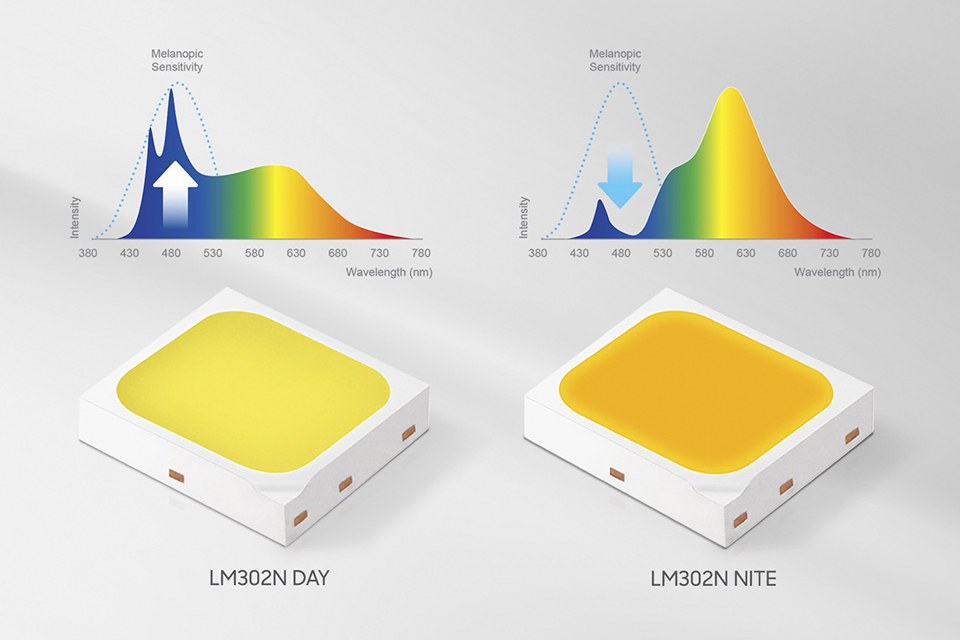Samsung Electronics Unveils Its First Family of Human-Centric LEDs to Enhance Indoor Lifestyles
Samsung Electronics Co., Ltd., a world leader in advanced digital component solutions, today unveiled its first "human-centric" LED packages, collectively known as LM302N. Engineered with carefully created light spectra, the LM302N family helps human bodies adjust melatonin levels indoors, making people feel more energetic or relaxed depending on their daily life patterns.
LM302N Lineup:
|
Product |
CRI* |
CCT (K)** |
M/P Ratio*** |
MDER**** |
Size |
|
LM302N DAY |
80+ |
3000 |
0.65 |
0.59 |
3.0x3.0mm |
|
3500 |
0.74 |
0.67 |
|||
|
4000 |
0.84 |
0.76 |
|||
|
5000 |
1.03 |
0.93 |
|||
|
5700 |
1.14 |
1.03 |
|||
|
6500 |
1.24 |
1.12 |
|||
|
LM302N NITE |
80+ |
1800 |
0.20 |
0.18 |
3.0x3.0mm |
|
2200 |
0.28 |
0.25 |
|||
|
2700 |
0.37 |
0.34 |
|||
|
3000 |
0.48 |
0.43 |
|||
|
3500 |
0.56 |
0.51 |
|||
|
4000 |
0.64 |
0.58 |
"The benefits of using Samsung's LM302N reach beyond the basic lighting function of visual recognition, by improving the non-visual biological effects of lighting on people," said Un Soo Kim, senior vice president of LED Business Team at Samsung Electronics. "Our LED solutions are ushering in a whole new human-oriented approach of using artificial lighting to enhance productivity and relaxation, benefitting modern-day indoor lifestyles."
Melatonin, a hormone which regulates the sleep-wake cycle, responds to the cyan wavelength range of light. Brighter cyan-concentrated lighting suppresses the body's production of melatonin, increasing concentration and enabling a greater overall sense of alertness. Similarly, a lower cyan light intensity minimizes disturbances to the natural onset of the body's melatonin production, helping to promote sleep quality.
Samsung's LM302N utilizes precisely designed light spectra with optimized amounts of cyan to accommodate lighting needs to the extent desired at any given point in time: the LM302N DAY improves alertness and the LM302N NITE enhances relaxation. Standardized at 3.0x3.0mm, these offerings can fit in a wide range of lighting fixtures and are protected against humidity and heat.
The LM302N DAY can suppress the body's melatonin level more than 18 percent below that of conventional LED lighting. Available in a variety of color temperatures from 3000K to 6500K, the DAY package can be used in a diverse range of indoor applications, such as schools, offices, libraries and industrial sites, to enhance an individual's sense of awakeness and energy level.
The LM302N NITE can provide a proper level of brightness without hindering the release of melatonin, helping people to maintain the hormone level as if they were in a calm natural atmosphere at night. The body releases about five percent more melatonin under lights with the LM302N NITE packages than conventional LED packages, increasing relaxation. By comparison, spending a lot of time under conventional nighttime lighting can cause excessive alertness that makes it harder to fall asleep. Additionally, the LM302N NITE is offered in color temperatures between 1800K and 4000K, providing design flexibility to bring the benefits of relaxing light to a variety of lighting spaces.
The DAY and NITE packages can also be combined into a single luminaire to help people maintain their natural circadian rhythm 24 hours a day. This duo-lighting option is optimal for those who spend most of their time indoors and struggle with confused body clocks.
The newly launched LM302N family is now in mass production.
* CRI (Color rendering index): a standard method of measuring the quality of light by quantifying how the colors of surfaces appear when illuminated by a specific light source. The higher the CRI number, the more accurately a light source will render the color of an object
** CCT (Correlated color temperature): a general indication of the "warmth" or "coolness" of light. Light sources with a CCT below 3200K are usually considered warm (more red), whereas those with a CCT above 4000K are usually considered cool (more blue) in appearance
*** M/P Ratio (Melanopic/photopic ratio): a measure of how efficiently a light source triggers suppression of melatonin
**** MDER (Melanopic daylight efficacy ratio): a measure of how bright standard light (Illuminant D65, defined by International Commission on Illumination) should be for a level of melatonin suppression comparable to the tested light source.
About Samsung Electronics Co., Ltd:
Samsung inspires the world and shapes the future with transformative ideas and technologies. The company is redefining the worlds of TVs, smartphones, wearable devices, tablets, digital appliances, network systems, and memory, system LSI, foundry and LED solutions. For the latest news, please visit the Samsung Newsroom at news.samsung.com

